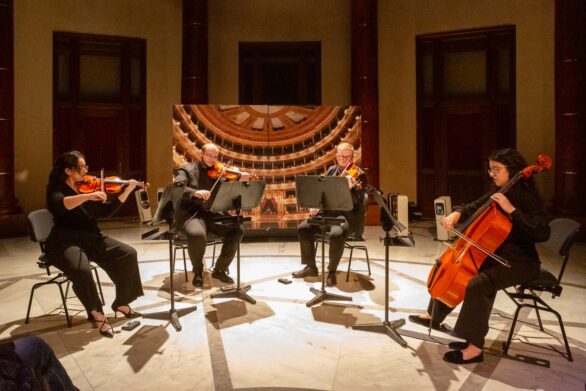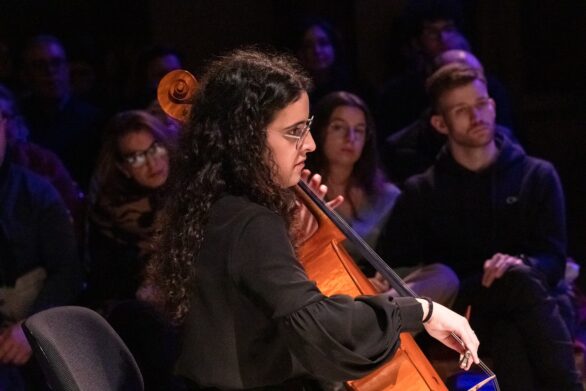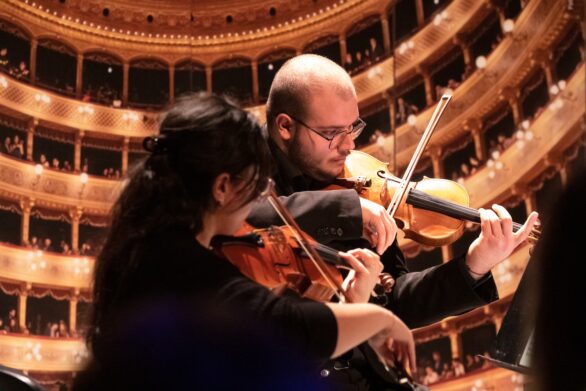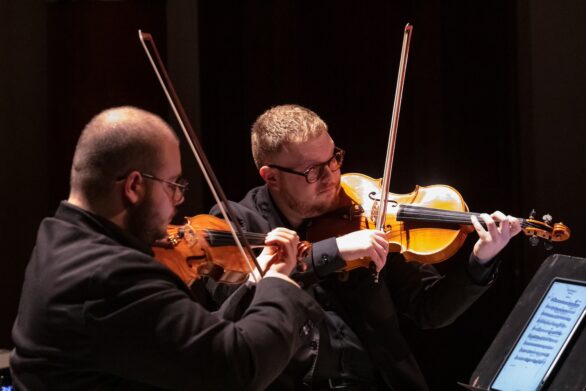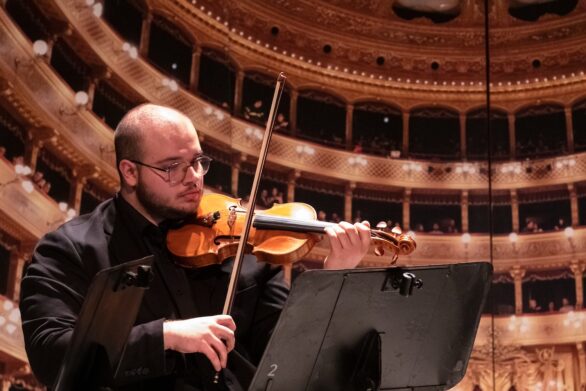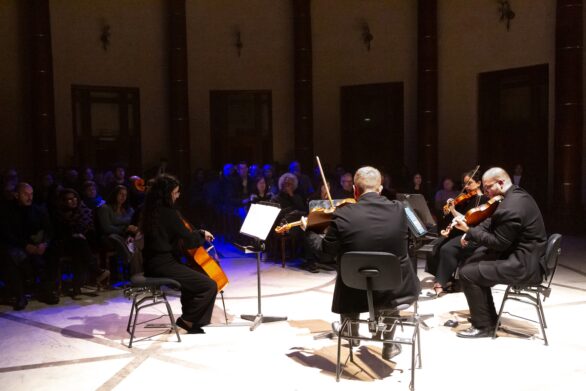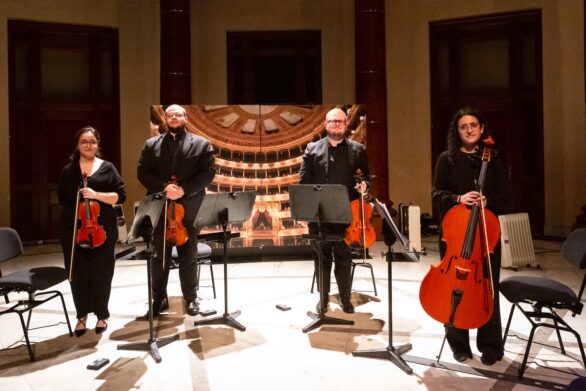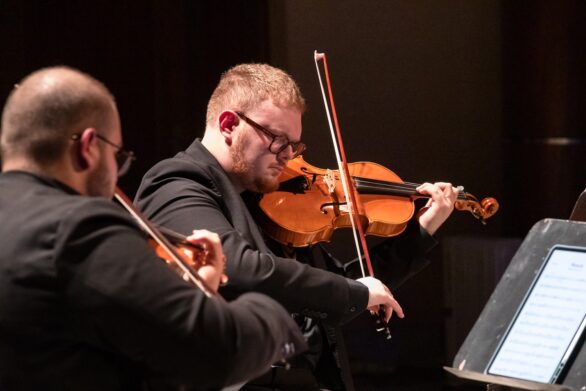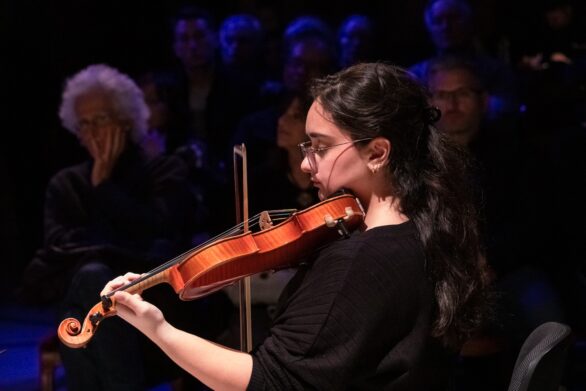About
We inform the audience that the concert has been canceled.
We are sorry for the inconvenience.
Saturday 14 and Sunday 15 February 2026 | Sala ONU
Love Arias
Teatro Massimo’s Cantoria
Massimo Youth Orchestra
Conductor Michele De Luca
Chorus Master Giuseppe Ricotta
Tickets
Full price: 10 €
Concession: 8 €
Students: 4 €
Programme
Music by
Wolfgang Amadeus Mozart, Vincenzo Bellini, Gaetano Donizetti, Gioacchino Rossini, Giacomo Puccini
About
Sunday February 15, 2026 | Sala ONU
Ars Sonora – String Quartet of the Massimo Youth Orchestra
Violin Denise De Luca
Violin Alessio Leonardo Calabrò
Viola Francesco Michele Martorana
Cello Beatrice Longo
Tickets
Full price: 10 €
Concession: 8 €
Students: 4 €
Programme
Wolfgang Amadeus Mozart
Allegro from Eine kleine Nachtmusik in G Major K 525
Wolfgang Amadeus Mozart
Allegro from the String Quartet n. 15 in D Minor K1 421, K6 417b
Wolfgang Amadeus Mozart
Divertissment for Strings in D Major K.136 / 125a
Anton Webern
Langsamer Satz
Luis Gardel
Por una cabeza
Nunzio Ortolano
Manola
Gallery
Ph. Rosellina Garbo
About
Tuesday, August 10 2021, 09:15 pm
Please notice that a Digital Covid Certificate (Green Pass) is required to accesso the Teatro di Verdura.
Conductor Michele De Luca
Chorus Master Salvatore Punturo
Massimo Kids Orchestra
Cantoria, Youth Chorus and Rainbow Chorus of the Teatro Massimo
Coro di Danisinni
Master of the Coro di Danisinni Manlio Messina
Programme
Wolfgang Amadeus Mozart
Contredance for orchestra in C major “La Bataille”
Three German dances K 605
Ave verum corpus K 618
Leopold Mozart
Sinfonia dei giocattoli (Kindersinfonie)
Alberto Maniaci
Siamo piccoli cantori
Naohiro Iwai
Disney Fantasy
Salvatore Scinaldi
Drep West
John Williams
Highlights from Harry Potter (arr. Michael Story)
Ramin Djawadi
Game of thrones
Giuseppe Ricotta
Soffio d’eterno
Simone Piraino
Omaggio a Dante Alighieri
Antonín Dvořák
Antonín’s New World (arr. Dizzy Stratford)
Salvatore Nogara
Kids Tango
New Guidelines for the Audience
All the people who will access the Teatro Massimo or the Teatro di Verdura are required to take a few minutes to read the guidelines. Bear in mind that you are required to wear a face mask at all times, measure your body temperature upon arrival to the opera house, keep a physical distance of at least one metre from other people and sit in your selected seat.
Where to buy your tickets
At the Box-office, online on TicketOne.it, by calling the call centre. On performance days the Teatro di Verdura box-office is open from 7.15pm.
Concessions
Under 26, Under35 Card holders, 2020 subscribers, #iorinuncio al rimborso donors, students of the University of Palermo, Palermo Conservatory of Music and Palermo Academy of Arts, Uncalm, groups (at least 20 people for the same date), Diamond Card holders. 6 seats in section 1 are reserved for people with disabilities and their companions for each performance (at the fare of gradinata) - check with the box-office for further info. You will be required to show your ID/certificate to get the concession price.
About
Please notice that the performance scheduled on May 21 has been postponed to May 23.
The tickets already bought for May 21 will still be valid for the new date.
Conductor Michele De Luca
Choirmaster Giuseppe Ricotta
Dramaturgy and direction Gianpaolo Bellanca e Myriam Leone
from an idea by Pippo Lo Manto
Music by Alberto Maniaci, Ola Gjelo, Robert W. Smith, Simone Piraino, Giuseppe Ricotta
Video projections and images Claudio Di Domenico
Sketches Christian Lanni
Pictorial realisation Christian Lanni (Selva Oscura), Giuseppe Accardo (Inferno), Candida Ilenia Scalia (Purgatorio)
Giuseppe Ciaccio (Ascension), Innocenzo Mancuso (Paradise) Set Design Department of the Fondazione Teatro Massimo
Stage movements Mariella Petrotta
Assistant director Francesco D’Amico
Compagnia Volti dal Kaos
Cantoria of the Teatro Massimo
Massimo K&Y Symphonic Band
For audiences aged 12 and over
Tickets
Performance of May 21st (for families):
10€ to 25€
Performance on May 23nd (for families):
Students 5 €
Full price 12 €
Reduced price 10 €
For more information
Programme
Robert W. Smith
The Divine Comedy
About
From March 25th to March 28th, 2025 | Sala degli Stemmi
from 6 to 9 years old | Reservations from January 20th
Concept, direction and choreography Carmen Marcuccio e Annamaria Margozzi
Ideazione, regia e coreografia Carmen Marcuccio
Teatro Massimo Corps de ballet
Corps de ballet Director Jean-Sébastien Colau
Tickets
Reduced price for students: 4 €
Full price: 10 €
For further information
Lo spettacolo in breve
The plot
An interactive dance performance in which the young public actively collaborates in the creation of the show, thanks to the use of colours and abstract painting. The show is born from the interaction between children and dancers, each time producing a unique and unrepeatable result. A work in progress, light, magical but above all experimental.
The children, inspired by the musical pieces, will see the colours they have chosen come to life through the bodies of the dancers and the abstract strokes drawn by them in real time on the canvas interpreted by a dance inspired by their emotional trajectories. The memory will be nourished by the return to the class of the canvas produced, a work of art “signed” by the children and the Corps de Ballet of the Teatro Massimo, in memory of the sensory journey experienced together.
Performances from Tue to Fri are events for school groups.
In case seats are available to the general audience, they will be on sale on the same day of performance at the box-office.
Saturday performances are open to all.
